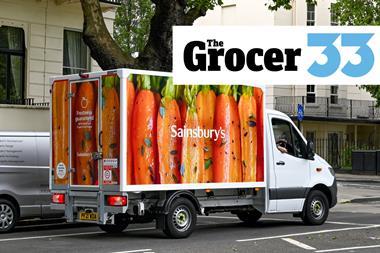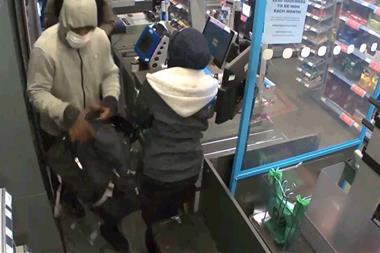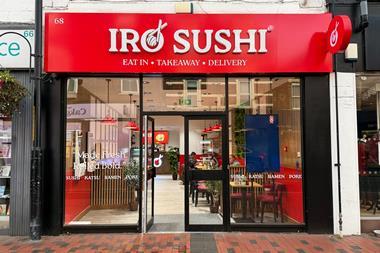Sir Peter Davis wants to see fresh debate about food chain issues unhindered by relentless competitive jostling, as he tells Clive Beddall
Sainsbury chief executive Sir Peter Davis blames the major multiples' "dog eat dog" attitude for his company's controversial decision to jump the gun on the other top chains and launch its own code of trading practice with suppliers.
Sir Peter, recently appointed to the government's Commission into the Future of Food and Farming, says: "One of the things that distresses me most, coming back to this industry after 15 years, is that the chains are not acting sufficiently in the interests of the trade or the consumer. We are too focused on individual competitive positions."
Criticised for launching its own version of the code before the top chains and manufacturers had agreed a legally binding version with the DTI, Sir Peter explained his company's action: "No sensible dialogue can take place easily between the major retailers. They are all worried about one versus another, and the fact one may jump the gun on an issue. I regret that."
"I know people find it difficult to believe, but the sector is so competitive that I cannot have a serious conversation with my competitors without feeling that someone is out to take advantage. And that's why industry forums like the IGD's Policy Issues Council are important. Heads need to be banged together so that sensible conversations can take place, and people don't break ranks to gain an advantage for competitive reasons."
Sir Peter hopes that through the efforts of its president, David Webster of Safeway, the IGD will encourage "sensible discussion". But he warns: "It needs the commitment of the senior people to go to those discussions themselves, and not to send others. They must be prepared to talk in an open-minded spirit and not seek advantage one from another. And in the light of that, perhaps we should not have published our code ahead of the industry one."
However, Sir Peter believes the foot and mouth crisis is at least making the chain think "long and hard" about the crucial issues affecting food and farming. And as chairman of Business in the Community he is working with the Prince of Wales to address rural matters affecting the chain.
Citing a string of new Sainsbury partnerships with producers, Sir Peter believes his company is better at understanding primary producers' role than when he was with the multiple 15 years ago. "Our relationships with farmers and the NFU, are better. And although they are fairly feisty from time to time, there is regular and constant dialogue and a better understanding about where we all stand. However, there's a hell of a long way to go."
Turning to the ongoing discussions between farmers and retailers about a more united food chain, he adds: "We must organise a fresh debate, rather than just taking up traditional positions. We need to decide what we really want of the industry. Do we want to be self-sustaining or not?"
Sir Peter believes the current series of mini debates need to be more widespread. "We all need to rethink our positions. I thought I knew what my company's policy was in regard to buying meat. But I met a farmer's wife at a supper party and she said things to me that I utterly rejected until I came back to my office and asked questions. In particular, I discovered that the role of middle men in the sheep industry is much more complex than I had appreciated. Having looked harder at it, I believe there are real issues about the way farmers market some of their animals and the way in which we buy those animals.
"Retailers and farmers must have serious conversations about each other's positions. And this should be done through industry groupings so people don't feel too browbeaten by the alleged power of the multiples. As an industry, perhaps we need to change the way do things in certain areas, and similarly, farmers also need to do the same."
Sir Peter believes the recently launched Commission on the Future of Farming and Food, despite being given a very tight agenda by Tony Blair, is a "useful opportunity" to debate all the issues of the agri-food sector.
But he warns: "All partners in the chain must be prepared to listen and review their positions, and even change them."
Ominously, the Sainsbury chief executive believes the discredited "rip-off in grocery" tirades will keep resurfacing. However, he counters the media critics with a swift comment: "We have an efficient food retailing sector. There is no evidence that we are ripping off consumers."
But in a blunt message to his colleagues in the multiple sector, he adds: "Instead of saying my prices are better than your prices, blah, blah, blah' the big retailers ought to be spending more time as an industry pointing out that there is a very good international comparison."
{{FEATURES }}
Close menu
- Home
- Retail & Wholesale
-
Products & Suppliers
- Back to parent navigation item
- Products & Suppliers
-
Product Categories:
- Back to parent navigation item
- Product Categories:
- Alcoholic drinks
- Bakery
- Cereals & breakfast
- Cheese
- Chicken & poultry
- Chocolate
- Confectionery
- Crisps, nuts & snacks
- Dairy
- Fish
- Fresh produce
- Frozen
- Household
- Meat
- Own Label
- Sauces & condiments
- Seasonal
- Soft drinks
- Vaping
- Vegan & plant-based
- World foods
- Suppliers
- People
- Reports & Data
-
Topics A-Z
- Back to parent navigation item
- Topics A-Z
-
Popular topics:
- Back to parent navigation item
- Popular topics:
- Cost of living crisis
- Crime
- Deposit Return Schemes
- Finance
- Government & Regulation
- Health
- Inflation
- Loyalty
- Marketing
- Mergers & Acquisitions
- New Product Development
- Sourcing
- Supply chain
- Sustainability & environment
- Technology
- Ultra Processed Foods
- Vaping
- A-Z all topics
- Content by type:
- Events
- Ask iA (beta)
- Subscribe now
Sign in to comment on this article
Not logged in before? Register for FREE guest access today.
You will be able to:
- Read more stories
- Receive daily newsletters
- Comment on stories
Advert


















No comments yet